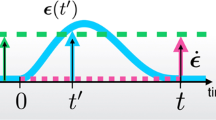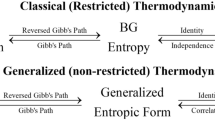Abstract
This theory originates from observations that the theory of particle interactions becomes much simpler and more capable of correlating apparently unrelated phenomena if it is postulated that electromagnetism and weak interactions are not primary properties of the nucleons but are acquired by virtue of their interaction with vector and axial vector fields.
This is a preview of subscription content, access via your institution
Access options
Subscribe to this journal
Receive 51 print issues and online access
$199.00 per year
only $3.90 per issue
Buy this article
- Purchase on Springer Link
- Instant access to full article PDF
Prices may be subject to local taxes which are calculated during checkout
Similar content being viewed by others
References
Sudarshan, E. C. G., and Marshak, R. E., Proc. Padua-Venice Conf., Mesons and Newly Discovered Particles, 1957; reprinted in Development of the Theory of Weak Interaction Theory (edit. by Kabir, P. K.) (Gordon and Breach, 1963).
Feynman, R. P., and Gell-Mann, M., Phys. Rev., 109, 193 (1958).
Gerstein, S. S., and Zeldovich, Ya. B., Zhur. Eksper. Teoret. Fiz. USSR 29, 698 (1955) (translation: Soviet Physics. JETP 2, 576 (1957)).
Weisberger, W. I., Phys. Rev. Lett., 14, 1051 (1965).
Review by Pinski, G., Sudarshan, E. C. G., and Mahanthappa, K. T., in Proc. Thirteenth Intern. Conf. High Ener. Phys., Berkeley (1966).
Proc. Tenth Intern. Conf. High Ener. Phys., Rochester (1960).
Sakurai, J. J., Ann. Phys., 11, 1 (1960); Phys. Rev. Lett., 17, 1021 (1966).
Schwinger, J., Phys. Lett., 24 B, 473 (1967).
Wess, J., and Zumino, B., New York University report.
Kroll, N., Lee, T. D., and Zumino, B., Phys. Rev., 157, 1376 (1967).
Sudarshan, E. C. G., Syracuse Univ. Rep. NYO-3399-137.
Salam, A., Delburgo, R., and Strathdee, J., Proc. Roy. Soc., A, 284, 140 (1965).
Schwinger, J., Phys. Rev. Lett., 17, 923 (1967).
Freund, P. G. P., Phys. Rev. Lett., 17, 1021 (1967).
Goldberger, M. L., and Treiman, S. B., Phys. Rev., 110, 1178 (1958).
Gell-Mann, M., Phys. Rev., 111, 362 (1958).
Lee, Mo, and Wu, Phys. Rev. Lett., 10, 253 (1963).
Cabibbo, N., Phys. Rev. Lett., 10, 531 (1963).
Kuriyan, J. G., thesis, Univ. Syracuse (1966).
Olsson, M. G., Phys. Rev. Lett., 15, 710 (1965).
Yukawa, H., Proc. Phys.-Math. Soc. Japan, 17, 48 (1935): reprinted in Collected Papers on Meson Theory, suppl. Prog. Theor. Phys. Kyoto (1957–58).
Author information
Authors and Affiliations
Rights and permissions
About this article
Cite this article
SUDARSHAN, E. Theory of Universal Primary Interactions. Nature 216, 979–981 (1967). https://doi.org/10.1038/216979a0
Received:
Published:
Issue Date:
DOI: https://doi.org/10.1038/216979a0
This article is cited by
-
Application of the on-mass-shell current algebra to the {ie153-1} form factorform factor
Il Nuovo Cimento A (1974)
Comments
By submitting a comment you agree to abide by our Terms and Community Guidelines. If you find something abusive or that does not comply with our terms or guidelines please flag it as inappropriate.



